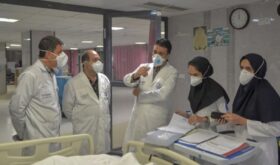Al-monitor – The Iranian TV series “Shahrzad,” which has gripped the attention of Iranians since it was first broadcast two years ago, has been high in drama. But real-life intrigues and allegations of corruption that dog the series, whose second season launched June 19, is just as exciting.
With an estimated cost of about 120 billion rials ($3.7 million), “Shahrzad” is viewed as one of the “largest and most expensive” in the history of Iran’s private cinema and television. The historical and romantic drama series takes place in the wake of the 1953 coup d’etat, when Prime Minister Mohammad Mosaddegh was overthrown, and focuses on a family saga that becomes even more complicated with power struggles, corruption, jealousy and mafia links. Directed by Hassan Fathi, it features Taraneh Alidoosti in the title role and Shahab Hosseini as the man who loves her. The role of corrupt bureaucrat Bozorg Agha, the head of a powerful mafia syndicate that had a strong role in the 1953 coup, is played by Ali Nassirian.
Despite criticisms about the accuracy and honesty of its historical-political narration, “Shahrzad” was successful from the start, but the second season has been marred by controversy.
In October, media outlets reported the arrest of Mohammad Emami, one of the show’s two producers, in connection with a financial scandal involving the Teachers Reserve Fund. Although the news was never officially denied or confirmed, it created doubts about the production of the second season.
On social media networks, hashtags such as No to Shahrzad and Question Shahrzad Producers began popping up. Fans demanded that the producers explain the funding sources for the show. Alidoosti responded to all the speculation in an Instagram post Oct. 25, writing, “Filming of Shahrzad season two has been underway for a month now. … Don’t worry and ignore the rumors.”
Responding to Alidoosti, Iranian journalist and writer Nader Fatourechi took to Facebook and asked the actress to explain the funding sources for “Shahrzad” and whether there were any ties to the financial corruption case at the Teachers Reserve Fund. Such discussions soon led to the creation of a campaign called “No to Shahrzad” on social media networks.
In an interview with Al-Monitor, Fatourechi said the reason for launching this campaign was to practice accountability and civil liberty. “I wanted to show that if we can’t deal with a small corruption case, then we definitely can’t approach the bigger fish,” he said.
The “No to Shahrzad” campaign asked everyone involved in the production of the TV series to stop their involvement with the show until the ties between the show’s investors and the corruption case at the Teachers Reserve Fund had been clarified.
The Teachers Reserve Fund was established in 1995 in an effort to promote the welfare of employees at Iran’s Ministry of Education. The fund makes up 45% of the investments at Sarmayeh Bank, Iran’s sixth largest private bank. On Aug. 29, 2016, member of parliament Amir Khojasteh was the first to talk about an embezzlement from this fund of almost 80 trillion rials, or $2.46 billion.
Less than two months later, on Oct. 20, judiciary spokesman Gholam-Hossein Mohseni Ejei announced that Shahabeddin Ghandali, the CEO of the fund, and four others had been arrested in connection with the case.
On Dec. 24, Mohammad Reza Mohades Khorasani, the deputy to the fund’s former CEO, said about Emami’s role in the case, “To produce a film, Mr. Emami made connections with Mr. Ghandali and received a 1-1.3 trillion toman [$307.7 million to $400 million] loan from him. However, he was not able to return this and is now in prison.”
The controversy once again brought the issue of money laundering in Iran’s cinema to the surface. In recent years, several films have been made with the investment of individuals who are currently in prison on charges of financial corruption. One example is Iranian businessman Babak Zanjani, who with the help of the United Arab Emirates-based Sorinet Group invested in the production of films such as “Naghsh-e Negar” (“Negar’s Role”), “Hich Koja Hich Kas” (“No Where, No Body”) and “Sizdah 59” (“Thirteen 59”).
On Jan. 4, Amir Khojasteh, the head of the parliamentary faction for the fight against economic and bureaucratic corruption commented on speculation about money laundering by the producer of “Shahrzad” and said, “Some cases involving him and money laundering have been confirmed and the parliament has referred these to the judiciary and [other] monitoring organizations for further review.”
According to Article 44 of Iran’s constitution, private television networks are not allowed to operate in the country. Thus, the TV series industry has been limited to Iranian state broadcaster IRIB, which operates under the supervision of Supreme Leader Ayatollah Ali Khamenei. In 1993, Iran’s Supreme Council of the Cultural Revolution submitted a resolution to the Ministry of Culture and Islamic Guidance to come up with a system for “dealing with cultural invasion and improving the level of public culture” to remove the restrictions on video-related activities.
The next year, Iran’s Visual Media Institute began work as a subgroup of the Ministry of Culture. The activities of this state institute and other private institutes, which were established after 2000, were mainly limited to duplicating, selling and renting IRIB productions.
In 2010, the first series produced by the private sector found its way to Iranian homes through the home video entertainment network. This was a comedy series called “Ghahve Talkh” (“Bitter Coffee”), which was successfull between 2010 and 2012 but then stopped due to financial problems.
In recent years, the Iranian cinema’s private sector has created several other products through home video entertainment that were not very successful. “Shahrzad” was the first series in a long time that was able to bring Iran’s many cultural classes together to enjoy the love story of Farhad and Shahrzad.
After a 3-month pause in production, the first episode of the second season of “Shahrzad” found its way to Iran’s home video entertainment network June 19. Just two weeks earlier, Emami had once again sparked controversy by announcing during a news conference in Canada that “Shahrzad” could be streamed globally through Netflix and Lotus Play. Emami said, “The second season of ‘Shahrzad’ is a new chapter in Iranian series making and the quality of the story, structure and technique in this season is much higher than the last season.”
Mohammad Hadi Razavi is another investor in “Shahrzad.” He is the son-in-law of Mohammad Shariatmadari, Iran’s vice president for executive affairs and the CEO of the financial group Fatemi. In 2016, Razavi took part in the elections for Iran’s Chamber of Commerce under the slogan, “Shiite wealth lobby against Zionist investment lobby.” But he failed to secure enough votes.
One must now wait and see if given all the controversy, from a financial corruption case to the “No to Shahrzad” campaign, the second season of “Shahrzad” can succeed in attracting viewers. The show’s writers, Hadi Razavi and Naghmeh Samini, refused to answer Al-Monitor’s questions in this regard.
Fatourechi believes that the “No to Shahrzad” campaign has achieved its goals, saying, “We made them panic and threw obstacles in their way, or perhaps it is better to say in their ‘money laundering.’ However, we do not have the power to stop them, especially since they are backed by powerful gangs and influential people and we are just a bunch of ordinary citizens.”
 Shabtabnews In this dark night, I have lost my way – Arise from a corner, oh you the star of guidance.
Shabtabnews In this dark night, I have lost my way – Arise from a corner, oh you the star of guidance.


